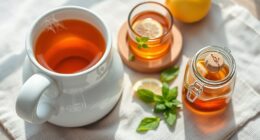As an individual who grapples with anxiety, I am constantly seeking ways to alleviate my symptoms. Lately, there has been conflicting discourse surrounding the effects of ginger on anxiety. Some assert that ginger can exacerbate anxiety symptoms, whereas others tout its soothing properties. Thus, I took it upon myself to conduct some research and uncover the reality behind this contentious issue.
Ginger is a widely used spice that has been used for its medicinal properties for centuries. It is known for its anti-inflammatory and antioxidant properties and is commonly used to treat digestive issues, nausea, and pain. However, as with any substance, there are potential side effects and concerns about its impact on mental health.
In this article, I will explore the potential link between ginger and anxiety, examining the scientific evidence and discussing the benefits and precautions associated with consuming ginger for anxiety management.
Key Takeaways
- There are conflicting claims about ginger’s potential to cause anxiety.
- Ginger supplements may be effective in reducing symptoms of anxiety, but caution should be exercised as high doses may have adverse effects.
- Scientific evidence on the link between ginger and anxiety is limited and more research is needed to confirm its potential benefits.
- Ginger may interact with certain medications and dosage recommendations for ginger supplements may vary depending on individual health status and medication regimen.
What is Ginger?
Ginger’s a spicy root that’s commonly used in cooking and has a distinct, zesty flavor. There are many different varieties of ginger, each with its unique taste and aroma.
Some of the most common varieties include fresh ginger root, pickled ginger, and ground ginger powder. In addition to its culinary uses, ginger has also been used for its medicinal properties.
It’s high in antioxidants and has anti-inflammatory effects, making it a popular natural remedy for various ailments, including nausea, muscle pain, and arthritis. However, some people have raised concerns about whether ginger can cause anxiety.
Anxiety and Its Causes
Feeling uneasy or worried can stem from various factors, such as internal or external stressors. Anxiety is a common mental health disorder that affects millions of people worldwide.
The causes of anxiety are complex and varied, and may include biological, environmental, and psychological factors. Some of the common symptoms of anxiety include restlessness, irritability, difficulty concentrating, and sleep disturbances.
Treatment for anxiety usually involves a combination of medication, therapy, and lifestyle changes. Coping strategies such as exercise, relaxation techniques, and mindfulness can also be helpful in managing anxiety.
It’s important to seek professional help if you’re experiencing symptoms of anxiety, as this can greatly improve your quality of life. The next section will explore the potential link between ginger and anxiety.
The Potential Link Between Ginger and Anxiety
I’m interested in exploring the potential link between ginger and anxiety. Specifically, I want to look at how ginger might impact heart rate and blood pressure, as these physiological responses are often associated with anxious feelings.
Additionally, I want to investigate how ginger interacts with medications commonly used to treat anxiety, as this could have important implications for individuals who use both ginger and anxiety medications.
Ginger’s Impact on Heart Rate and Blood Pressure
You’ll be interested to know that consuming ginger may have an effect on your heart rate and blood pressure. Studies have shown that ginger can increase heart rate variability, which is a measure of the variation in time between heartbeats. This is a good thing because higher heart rate variability is associated with better cardiovascular health.
Additionally, ginger has been found to decrease the sympathetic nervous system response, which is responsible for the fight or flight response. This means that ginger can help to reduce stress and anxiety, which can have a positive impact on heart rate and blood pressure.
It’s important to note that while ginger can have positive effects on heart rate and blood pressure, it may interact with certain medications. It’s always a good idea to talk to your healthcare provider before adding any new supplements or herbs to your regimen, especially if you’re taking medications for heart or blood pressure conditions.
In the next section, we’ll explore these potential interactions in more detail.
Interaction with Medications
When taking medications for heart or blood pressure conditions, it’s important to talk to your healthcare provider before adding any new supplements or herbs to your regimen, as they may interact with each other.
Ginger, while generally considered safe, can interact with certain medications, including blood thinners and diabetes medications. It’s important to discuss any potential drug interactions with your healthcare provider before taking ginger supplements.
Dosage recommendations for ginger supplements may also vary depending on your individual health status and medication regimen. It’s important to follow recommended dosages and avoid taking excessive amounts of ginger, as this may lead to adverse effects such as stomach upset and heartburn.
Always talk to your healthcare provider before starting any new supplements, including ginger.
Moving on to the next section, it’s important to consider the scientific evidence behind ginger’s potential impact on anxiety.
Scientific Evidence
I’ve researched studies on the potential link between ginger and anxiety, and there’s some evidence to suggest that ginger may have an effect on anxiety levels.
However, it’s important to note that the research is limited and often inconclusive. While some studies have shown a positive effect on anxiety, others haven’t found any significant results.
Studies on Ginger and Anxiety
If you’re curious about the effects of ginger on anxiety, researchers have conducted several studies examining this very topic. Here are some interesting findings that could help you decide whether to try ginger tea or other natural remedies:
-
Ginger may reduce symptoms of anxiety: A 2019 study published in the Journal of Ethnopharmacology found that ginger extract reduced anxiety-like behavior in rats. The researchers concluded that ginger may have an anxiolytic effect, meaning it could help alleviate anxiety symptoms in humans as well.
-
Ginger may enhance the effects of medication: A 2012 study published in the Journal of Clinical Psychopharmacology found that ginger enhanced the anti-anxiety effects of a prescription medication called lorazepam. The study authors suggested that ginger could be used as an adjunct to medication for people with anxiety disorders.
-
More research is needed: While these studies are promising, it’s important to note that they were conducted on animals and a small sample of humans. More research is needed to confirm the potential benefits of ginger for anxiety and to determine the optimal dosage and duration of use.
While the studies on ginger and anxiety are intriguing, there are limitations to the research that should be considered. For example, the studies were conducted on animals and a small sample of humans, so we can’t be certain that the same results would occur in larger groups of people. Additionally, the optimal dosage and duration of ginger use for anxiety are still unknown. Nonetheless, the findings suggest that ginger may have some potential benefits for anxiety management and could be worth exploring further.
Limitations of the Research
Despite the promising findings, there are limitations to the research on the potential benefits of using natural remedies for managing symptoms of anxiety. One of the main limitations is the study design. Most of the studies conducted on ginger and anxiety have been small-scale, single-blind, or non-randomized. This means that the results may not be generalizable to larger populations or may be biased due to the lack of blinding or randomization.
Another limitation is the sample size. Many of the studies have had small sample sizes, making it difficult to draw definitive conclusions about the effects of ginger on anxiety. Additionally, many of the studies have been conducted on healthy participants, rather than those with diagnosed anxiety disorders. This makes it unclear whether the findings would be applicable to individuals with clinical levels of anxiety.
Despite these limitations, the research on ginger and anxiety is still ongoing and may provide valuable insights into the potential benefits of natural remedies for anxiety management.
Moving on to the subsequent section about "ginger and anxiety disorders,"it’s important to consider the potential implications of these findings for individuals who suffer from anxiety disorders.
Ginger and Anxiety Disorders
Ginger’s potential to provoke panic attacks in those with anxiety disorders has been debated by experts in the field. While some studies have suggested that ginger supplements may be effective in reducing symptoms of anxiety, others have warned that high doses of ginger may cause adverse effects such as heart palpitations, sweating, and trembling. As a result, individuals with anxiety disorders are often advised to exercise caution when taking ginger supplements or other herbal remedies.
To better understand the potential benefits and risks of using ginger as a treatment for anxiety disorders, further research is needed. This may include studies on the optimal dosage of ginger, as well as investigations into the specific mechanisms by which ginger affects the body and mind. In the meantime, individuals with anxiety disorders may wish to consider alternative treatments or speak with a healthcare professional before using ginger supplements or other herbal remedies.
When considering the use of ginger for anxiety relief, it is important to note that there is a difference between consuming ginger in food form versus taking ginger supplements. The bioavailability of ginger may differ depending on the form in which it is consumed, and supplements may contain higher doses of active compounds. As such, individuals may wish to explore the use of ginger in food form, such as in teas or as a seasoning in meals, before trying ginger supplements.
Ginger Supplements vs. Ginger Foods
Consuming ginger in food form may be a safer option for individuals seeking anxiety relief, as the bioavailability and dosage of active compounds in supplements can vary. While ginger supplements are widely available, the debate over their efficacy and safety continues. Some studies suggest that ginger supplements may be effective in reducing symptoms of anxiety, while others have found no significant difference compared to a placebo. Additionally, some individuals may experience adverse effects from taking high doses of ginger supplements, such as gastrointestinal discomfort or interactions with medications.
On the other hand, incorporating ginger into your diet through food recipes not only provides a lower and more steady dosage of active compounds, but also offers a variety of health benefits beyond anxiety relief. Ginger is a versatile ingredient that can be used in both sweet and savory dishes. For example, you can add grated ginger to a stir-fry or use it to make ginger tea with honey for a soothing drink. Ginger can also be used in baking, such as gingerbread or ginger snaps. By incorporating ginger into your diet through food recipes, you not only get the potential anxiety-reducing benefits but also a delicious and healthy addition to your meals.
Moving forward, let’s explore the other benefits of ginger beyond its potential for anxiety relief.
Other Benefits of Ginger
I’m excited to share with you about the other benefits of ginger that I’ve discovered through my research. One of the most notable benefits is its anti-inflammatory properties, which can help reduce pain and swelling in the body.
Additionally, ginger has been shown to improve digestive health by reducing nausea, vomiting, and indigestion.
Lastly, ginger may also boost the immune system, helping to fight off illness and infection.
These are just a few of the many benefits that ginger can provide, making it a valuable addition to any diet.
Anti-Inflammatory Properties
You’ll be surprised to know that ginger is like a superhero that fights inflammation in your body, just like how Superman fights crime in Metropolis. The anti-inflammatory properties of ginger have been studied extensively and have been shown to be effective in reducing pain and inflammation in the body. This is great news for those who suffer from chronic pain or inflammatory conditions such as arthritis.
In fact, many people have found relief from their pain by incorporating ginger into their diets or using it topically. Recipes with ginger are easy to find and can be incorporated into many different dishes. Ginger tea is a popular way to consume ginger and has been used for centuries to aid in digestion and reduce inflammation in the body. Additionally, ginger can be added to smoothies, stir-fries, and even baked goods for a delicious and healthy boost.
So, if you suffer from pain or inflammation, consider adding ginger to your diet and see if it helps alleviate your symptoms. Now, let’s move on to the next topic and explore how ginger can benefit your digestive health.
Digestive Health
Get ready to improve your digestive health with the help of ginger! Ginger has been used for centuries to relieve digestive problems such as bloating, nausea, and constipation. One of the reasons ginger is so effective for digestive health is its probiotic benefits.
Probiotics are beneficial bacteria that live in our gut and help keep our digestive system healthy. Ginger helps promote the growth of these good bacteria, which can improve digestion and overall gut health.
Another way ginger helps with digestive health is by increasing fiber intake. Fiber is essential for maintaining a healthy digestive system, as it helps regulate bowel movements and promotes the growth of good bacteria in the gut. Ginger is a good source of dietary fiber, which can help relieve constipation and other digestive problems.
Consuming ginger regularly can help improve digestive health and reduce the risk of digestive disorders. As we move into the next section about immune system boost, it’s important to note that digestive health and immune function are closely linked. A healthy gut is essential for a strong immune system, and ginger’s probiotic benefits and fiber content can help support both.
Immune System Boost
Boost your immune system by incorporating more vitamin C into your diet, as it has been shown to increase white blood cell production and reduce the duration of colds by up to 8%. One great way to do this is by adding ginger to your meals. This superfood is not only packed with antioxidants, but it also has anti-inflammatory properties that can help reduce inflammation in the body, which can weaken the immune system.
To help you incorporate ginger into your diet, here are a few recipes and dosage recommendations:
| Recipe | Ingredients | Dosage |
|---|---|---|
| Ginger tea | Fresh ginger root, water, honey | 1-2 cups per day |
| Ginger shots | Fresh ginger root, lemon juice, honey | 1-2 shots per day |
| Ginger stir-fry | Fresh ginger root, vegetables, protein of choice, soy sauce | 1-2 servings per week |
Incorporating ginger into your diet can be a tasty and healthy way to give your immune system a boost. However, it is important to note that ginger may not be suitable for everyone and may have potential side effects. Let’s explore these precautions and side effects in the next section.
Precautions and Side Effects
It’s important to be aware of the potential precautions and side effects of consuming ginger. While ginger has numerous health benefits, it’s important to take it in moderation and follow the recommended dosage and administration guidelines. Consuming excessive amounts of ginger can lead to digestive issues such as bloating, gas, and heartburn.
In addition, ginger may interact with certain medications, including blood thinners and diabetes medications, so it’s important to consult with a healthcare professional before incorporating ginger supplements into your diet. While ginger tea is generally considered safe, it’s important to note that ginger supplements may contain higher concentrations of ginger, which may increase the risk of adverse side effects. It’s important to always read the label and follow the dosage instructions carefully.
As we explore alternative treatments for anxiety, it’s important to consider the potential side effects and interactions of any supplements or natural remedies.
Alternative Treatments for Anxiety
You’re probably aware that anxiety can be a debilitating condition, but did you know that there are alternative treatments that can help manage symptoms without relying on medication?
Herbal remedies, such as chamomile, passionflower, and valerian root, have been found to have calming effects on the body and mind. These natural remedies can be taken in supplement form or brewed into a tea for easy consumption.
Another alternative treatment for anxiety is mind-body therapies, such as yoga and meditation. These practices have been shown to reduce stress and improve overall well-being. Mindfulness meditation, in particular, has been found to be effective in reducing symptoms of anxiety.
By focusing on the present moment and learning to observe thoughts without judgment, individuals can learn to manage their anxiety more effectively. Incorporating these alternative treatments into a daily routine can lead to a reduction in symptoms and an overall improvement in mental health.
Frequently Asked Questions
Can ginger help to reduce anxiety symptoms?
I find that drinking ginger tea can help reduce my anxiety symptoms. Along with relaxation techniques, ginger’s anti-inflammatory properties may positively impact mood and reduce stress levels. However, more research is needed to fully understand its effects.
What is the recommended dosage of ginger for anxiety relief?
I’ve found that a recommended dosage for ginger to relieve anxiety is 250-500mg, 2-4 times per day. Ginger tea can also be effective for anxiety management. Always consult with a healthcare professional before starting any new supplement regimen.
Are there any foods that should be avoided while taking ginger supplements for anxiety?
When taking ginger supplements for anxiety relief, it is best to avoid foods that may interact with it. These include blood thinners and high doses of aspirin. The best time to take ginger is before meals.
Can ginger supplements interact with other medications used for anxiety treatment?
As someone taking ginger supplements for anxiety, it’s important to be aware of potential interactions with anxiety medications. Always consult with a healthcare provider to ensure ginger supplement safety and avoid any negative effects.
How long does it take for ginger to start working for anxiety relief?
I started drinking ginger tea daily and noticed a decrease in my anxiety symptoms after a week. Ginger contains compounds that have been shown to have calming effects on the body. It can be a helpful addition to natural remedies for anxiety.
Conclusion
In conclusion, while ginger is generally considered safe and has many health benefits, including anti-inflammatory and anti-nausea properties, there’s currently no scientific evidence suggesting it causes anxiety. Some studies have shown ginger may have a positive effect on anxiety disorders. However, it’s important to consume ginger in moderation and consult with a healthcare professional if you have any concerns or pre-existing conditions.
For example, a recent study published in the Journal of Ethnopharmacology found that ginger extract reduced anxiety in mice by increasing levels of the neurotransmitter serotonin in the brain. This suggests ginger may have potential as an alternative treatment for anxiety disorders in humans. However, more research is needed to fully understand the effects of ginger on anxiety and to determine the optimal dosage and form of ginger for anxiety treatment.










